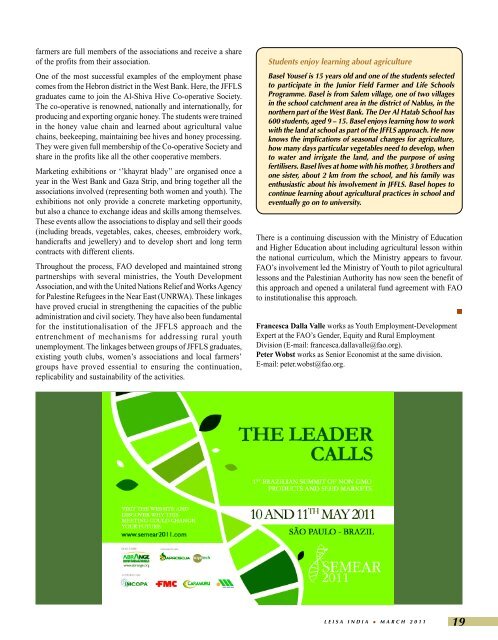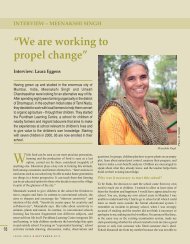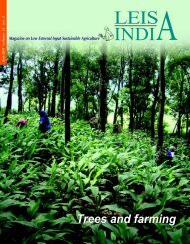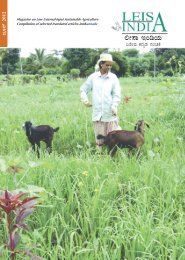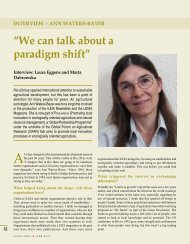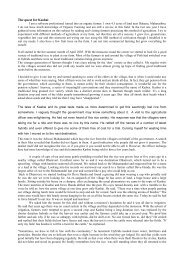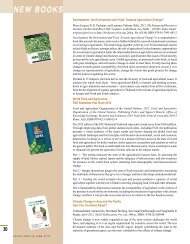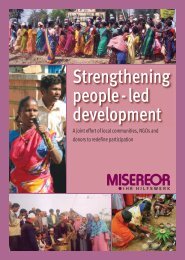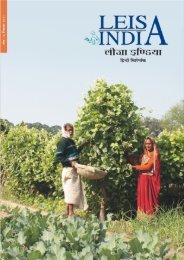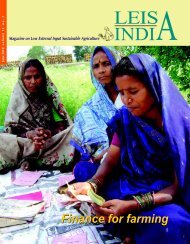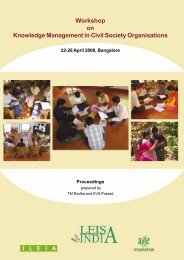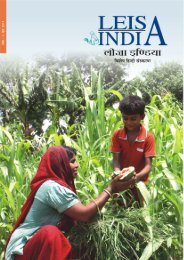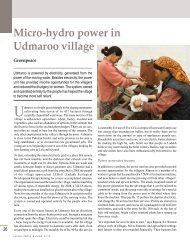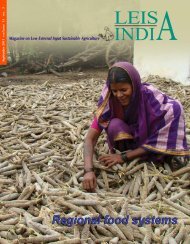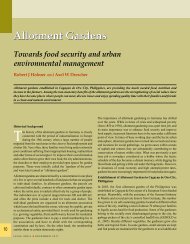Low external input sustainable agriculture - Leisa India
Low external input sustainable agriculture - Leisa India
Low external input sustainable agriculture - Leisa India
Create successful ePaper yourself
Turn your PDF publications into a flip-book with our unique Google optimized e-Paper software.
farmers are full members of the associations and receive a shareof the profits from their association.One of the most successful examples of the employment phasecomes from the Hebron district in the West Bank. Here, the JFFLSgraduates came to join the Al-Shiva Hive Co-operative Society.The co-operative is renowned, nationally and internationally, forproducing and exporting organic honey. The students were trainedin the honey value chain and learned about agricultural valuechains, beekeeping, maintaining bee hives and honey processing.They were given full membership of the Co-operative Society andshare in the profits like all the other cooperative members.Marketing exhibitions or ‘’khayrat blady’’ are organised once ayear in the West Bank and Gaza Strip, and bring together all theassociations involved (representing both women and youth). Theexhibitions not only provide a concrete marketing opportunity,but also a chance to exchange ideas and skills among themselves.These events allow the associations to display and sell their goods(including breads, vegetables, cakes, cheeses, embroidery work,handicrafts and jewellery) and to develop short and long termcontracts with different clients.Throughout the process, FAO developed and maintained strongpartnerships with several ministries, the Youth DevelopmentAssociation, and with the United Nations Relief and Works Agencyfor Palestine Refugees in the Near East (UNRWA). These linkageshave proved crucial in strengthening the capacities of the publicadministration and civil society. They have also been fundamentalfor the institutionalisation of the JFFLS approach and theentrenchment of mechanisms for addressing rural youthunemployment. The linkages between groups of JFFLS graduates,existing youth clubs, women’s associations and local farmers’groups have proved essential to ensuring the continuation,replicability and sustainability of the activities.Students enjoy learning about <strong>agriculture</strong>Basel Yousef is 15 years old and one of the students selectedto participate in the Junior Field Farmer and Life SchoolsProgramme. Basel is from Salem village, one of two villagesin the school catchment area in the district of Nablus, in thenorthern part of the West Bank. The Der Al Hatab School has600 students, aged 9 – 15. Basel enjoys learning how to workwith the land at school as part of the JFFLS approach. He nowknows the implications of seasonal changes for <strong>agriculture</strong>,how many days particular vegetables need to develop, whento water and irrigate the land, and the purpose of usingfertilisers. Basel lives at home with his mother, 3 brothers andone sister, about 2 km from the school, and his family wasenthusiastic about his involvement in JFFLS. Basel hopes tocontinue learning about agricultural practices in school andeventually go on to university.There is a continuing discussion with the Ministry of Educationand Higher Education about including agricultural lesson withinthe national curriculum, which the Ministry appears to favour.FAO’s involvement led the Ministry of Youth to pilot agriculturallessons and the Palestinian Authority has now seen the benefit ofthis approach and opened a unilateral fund agreement with FAOto institutionalise this approach.Francesca Dalla Valle works as Youth Employment-DevelopmentExpert at the FAO’s Gender, Equity and Rural EmploymentDivision (E-mail: francesca.dallavalle@fao.org).Peter Wobst works as Senior Economist at the same division.E-mail: peter.wobst@fao.org.•LEISA INDIA • MARCH 201119


